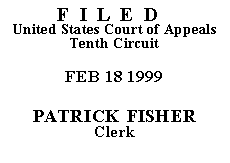

| ROBERT C. COLEMAN, |
|
On December 30, 1997, Mr. Coleman filed his complaint. On June 2, 1998 the district court issued a show cause order requiring Mr. Coleman, by June 26, 1998, to file proof of service or show cause why the action should not be dismissed for failing to serve the complaint within 120 days after filing it. See Fed. R. Civ. P. 4(m). On June 8, 1998, Mr. Coleman sought a 90-day extension of time based upon unspecified emergencies. R. doc. 11. On June 10, 1998, the district court discharged the order to show cause, indicating it would dismiss the case if proof of service was not filed by August 3, 1998. The order contains a certificate of service. R. doc. 3. Thus, on June 10, 1988, the district court granted Mr. Coleman's June 8, 1998 request for an extension of time, although the extension was for less than 90 days. On August 4, 1998, Mr. Coleman indicated that he "had not received an acknowledgment" of his June 8, 1998 request for a 90-day extension and sought a second extension of 30 days based upon the earlier unspecified emergencies. On August 5, 1998, the district court dismissed the case based upon noncompliance with its June 10 order. The district court denied reconsideration.
We review the district court's dismissal for an abuse of discretion. See Espinoza v. United States, 52 F.3d 838, 841 (10th Cir. 1995). Under Fed. R. Civ. P. 4(m) a plaintiff is entitled to a mandatory extension of time to serve for good cause shown and a permissive extension in the absence of good cause. Espinosa, 52 F.3d at 841. Although the district court did not elaborate on its reasoning for granting the first extension of time, the operative fact is that it granted the extension, although not for 90 days as requested. Even assuming that Rule 4(m) applies to the district court's denial of an additional 30 days, Mr. Coleman failed to demonstrate "good cause" for not obtaining proof of service by August 3, 1998, as directed by the district court. Unspecified emergencies do not constitute "good cause." Although Mr. Coleman makes the unverified assertion that he did not receive a response concerning his initial request for a 90-day extension, and the time may now have run on filing his Title VII claim, it was his responsibility to make reasonably prompt inquiry. See Despain v. Salt Lake Area Metro Gang Unit, 13 F.3d 1436, 1438-39 (10th Cir. 1994) (construing "good cause" requirement of former rule). Had he done so, he would have learned that the district court had granted his request for an extension of time and he could have planned based upon the August 3, 1998 extended deadline. That was not done, and we cannot find that the district court abused its discretion in declining to grant a permissive extension beyond the once-extended deadline in the absence of good cause.
Entered for the Court
Paul J. Kelly, Jr.
Circuit Judge
*. This order and judgment is not binding precedent, except under the doctrines of law of the case, res judicata, and collateral estoppel. This court generally disfavors the citation of orders and judgments; nevertheless, an order and judgment may be cited under the terms and conditions of 10th Cir. R. 36.3.
**. After examining the briefs and the appellate record, this three-judge panel has determined unanimously that oral argument would not be of material assistance in the determination of this appeal. See Fed. R. App. P. 34(a); 10th Cir. R. 34.1(G). The cause is therefore ordered submitted without oral argument.